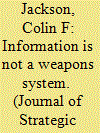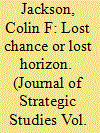| Srl | Item |
| 1 |
ID:
148221


|
|
|
|
|
| Summary/Abstract |
While many militaries have tried to capitalize on the potential of information operations in internal war, few have succeeded. I argue that military information campaigns fall short of expectations for two reasons. First, the theory of influence militaries generally embrace – communications as a non-lethal weapons system – is largely invalid. While treating information as a weapons system makes it easier to integrate it into the existing military planning system, this overstates the independent effects of communications on behavior and understates the importance of interactive effects of what commercial marketing theory refers to as the “marketing mix” – product, price, promotion, and placement. It would be more appropriate to treat military information operations as a form of marketing: a composite effort to induce a specific behavior in a target audience by applying a combination of material and ideational instruments. The marketing model suggests that the efficacy of information operations will depend not simply on the message and its delivery (promotion) but on the behavior the sender seeks to induce (the product), the costs of that behavior (the price), and the opportunities available for such behavior (the placement).
|
|
|
|
|
|
|
|
|
|
|
|
|
|
|
|
| 2 |
ID:
095268


|
|
|
|
|
| Publication |
2010.
|
| Summary/Abstract |
This article examines three questions surrounding American attempts at war termination in 1951. Was there a militarily feasible 'lost chance' for UN forces to advance to the narrow neck of the Korean peninsula? If so, why did American decisionmakers decline to pursue it? What effect might such operations have had on the course of the war and subsequent American thinking on limited war? It concludes that the US missed a critical opportunity to conclude the war on more favorable terms; that the American decision to forgo amphibious operations in June 1951 had less to do with military calculations than with the domestic political firestorm that followed MacArthur's relief; and that the 'lost chance' not only increased the cost and duration of the Korean War, but encouraged subsequent decision makers to overstate the risks of intra-war escalation and understate the risks of premature, de-escalation.
|
|
|
|
|
|
|
|
|
|
|
|
|
|
|
|